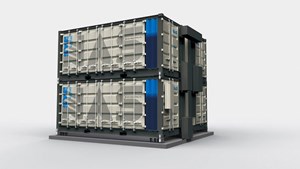News
HH2E orders high-capacity batteries from BASF for electrolyzers
HH2E has placed an order with BASF Stationary Energy Storage GmbH (BSES) for 93 MWhr of high-capacity sodium sulfur batteries (NAS Batteries). Additionally, HH2E has reserved production capacity for another 140 MWhr of these batteries.
This new contract marks a significant development in HH2E’s strategy of deploying their unique technology-mix. It comes on the heels of a recent agreement with Nel for acquiring initial electrolysis equipment.
The technology-mix of HH2E is designed to effectively harness the intermittent nature of solar and wind power generation. By integrating high-capacity batteries with electrolyzers, the system ensures that excess energy generated during periods of ample sunlight or wind is utilized for the production of green H2 or heat. This approach aims to maximize the utilization of green electrons, minimizing the curtailment commonly associated with renewable energy sources and the consequent high costs that the German state budget has to shoulder.
Ina Hahndorf, HH2E, said, “HH2E is unfolding a plan to deploy scalable projects in strategic locations across Germany. Each project is designed to have an initial input power capacity of 100 MW, expandable to 1 GW. Our aim is to achieve a total installed capacity of 4 GW by 2030, positioning us as one of the foremost producers of green H2 in Germany. Collaborating with quality and reliable suppliers such as BASF is crucial to our mission.”
Frank Prechtl, BASF, said, “We are happy to see that our sodium sulfur batteries are becoming the technology of choice for the challenging carbon-free H2 production application, after first installations in Asia now also in Europe. NAS batteries are high-energy, long-duration stationary batteries, perfectly suited to balance intermittencies of renewable energies. Thanks to the high safety standards they are the optimal choice for co-location with H2 production. By combining battery storage and electrolysis, HH2E will transform the variable input of sun and wind energy into a stable flow of carbon-free H2, heat and electricity. I see this first contract as a start of the CO2-free H2 age in Germany. We at BSES are proud to be part of it.”


